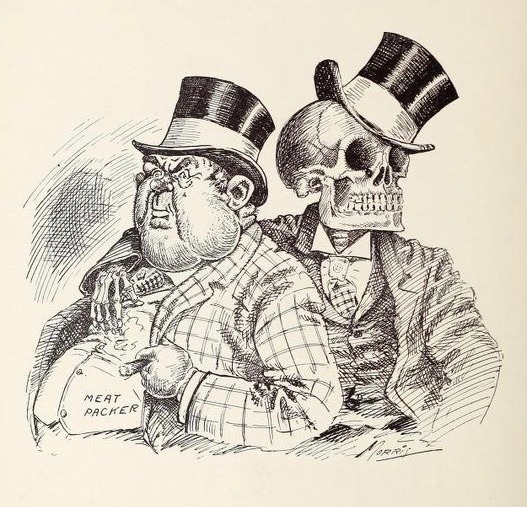Welcome to the Jungle

Lesson Plan
In this three-day inquiry lesson, students will learn about two congressional investigations that led to the creation of food safety regulations during the Progressive Era. Students will leave able to answer the compelling question “Would the food regulation laws of the early 20th century have happened without the publication of The Jungle?”
This free download includes:
- Lesson plan
- Primary sources
- Student worksheets
- Answer key

“The Chicago meat packer and his silent partner.” 1906
There was never the least attention paid to what was cut up for sausage; there would come all the way back from Europe old sausage that had been rejected, and that was moldy and white – it would be dosed with borax and glycerin, and dumped into the hoppers, and made over again for home consumption.
Upton Sinclair, The Jungle
In 1905, Upton Sinclair published The Jungle in monthly installments, intending to draw attention to the poor working conditions and low wages of workers in meat-packing factories. Due to his nauseating descriptions of the conditions of the meat that Americans were consuming, though, Sinclair’s novel became a catalyst for the pure food movement. The American public was horrified to read about the vile state of the food they were eating, and called on Congress and President Theodore Roosevelt to do something about it.
Content Standards
MI USHG – 6.3.1 Describe the extent to which industrialization and urbanization between 1895 and 1930 created the need for progressive reform.
MI USHG – 6.3.2 Analyze the social, political, economic, and cultural changes that occurred during the Progressive Era.
MI Civics – 3.2.1 Describe limits the U.S. Constitution places on power of the states and on the federal government’s power over the states.
MI Civics – 3.3.1 Describe and analyze how groups and individuals influence public policy.
MI Civics – 3.3.3 Explain the concept of public opinion, factors that shape it, and contrasting views on the role it should and does play in public policy.


